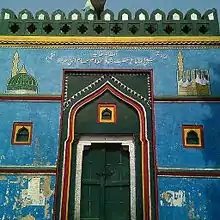Husam ad-Din Manikpuri
Husām ad-Dīn Mānikpūrī (Persian: حسام الدین مانکپوری) was a 15th-century Islamic scholar of North India. He belonged to the Chishti order, following his teacher Nur Qutb Alam of Bengal.
Husāmuddīn Mānikpūrī | |
|---|---|
 Manikpuri's tomb | |
| Personal | |
| Born | |
| Died | Date disputed |
| Resting place | Garhi Manikpur, Pratapgarh, Uttar Pradesh |
| Religion | Islam |
| Flourished | Late 14th to early 15th century |
| Denomination | Sunni |
| Jurisprudence | Hanafi |
| Order | Chishti Order |
| Muslim leader | |
| Teacher | Nur Qutb Alam |
Students
| |
Life
Manikpuri was a descendant of Mir Syed Shahabuddin of the Gardēzī Sadaat family, who had settled in Manikpur during the reign of Iltutmish (r. 1211–1236).[1]
He travelled to the Bengal Sultanate, where he studied under Nur Qutb Alam of Hazrat Pandua.[2] Following his studies, he fasted for seven years.[3]
Death
There is a debate on the date of his death. According to Ghulam Sarwar Lahori, he died on in 882 AH (1477-1478 CE).[4] On the other hand, Hasan Askari asserts that Manikpuri died on 15 Ramadan 853 AH (9 November 1449 CE).[5] Presently, his followers commemorate his annual urs (death anniversary) on 11 March. He is buried in Garhi Manikpur, Pratapgarh, Uttar Pradesh.
Writings
- Anīs al-ʿĀshiqīn
- Rafīq al-ʿĀrifīn, compiled by his disciple Farid bin Salar[6]
- Khulastul Awraad
- Risal e Mahvia
- Maktoobat-e-Mānikpūr
References
- Akhbarul Akhyar, Abdul-Haqq Dehlavi (d.1642 c.e.), Manuscript p 153
- Abu'l-Fazl ibn Mubarak. Ain-i-Akbari. p. 371.
- Sarwar, Ghulam. Khazinat al-Asfiya. Vol. 1. pp. 400–401.
- Askari, Hasan (1953). Proceedings of the Pakistan History Conference. Dacca.
{{cite journal}}: Missing or empty|title=(help) - 'Abd al-Haqq al-Dehlawi. Akbar al-Akhyar fi Asrar al-Abrar. p. 176.
Further reading
- Bahre Zakkhar
- Lataife-Ashrafi (Discourses of Ashraf Jahangir Semnani) Compiled by Nizam Yemeni, Edited and annotated by Syed Waheed Ashraf, published in 2010
- Mir'at-ul-Israr by Syed Abdur Rahman Chisti